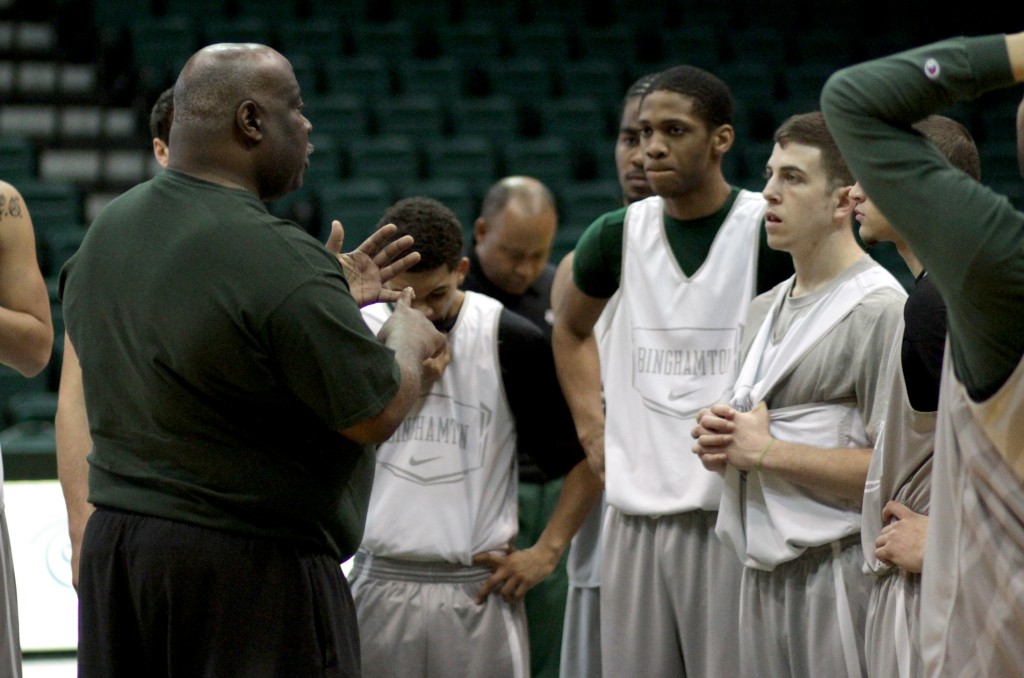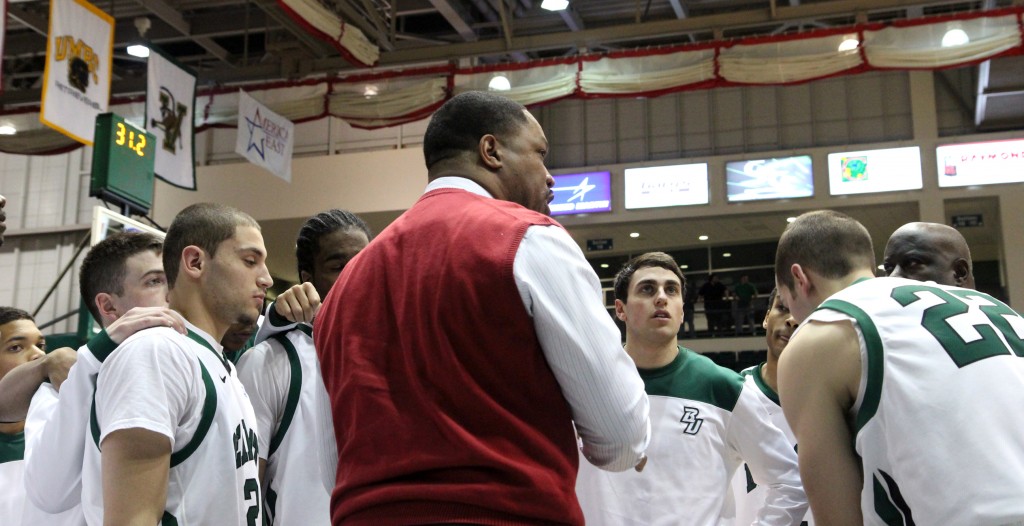
IT’S UNCOMMON for a Division I NCAA men’s basketball team to have multiple walk-ons. This team has four of them. For walk-ons to see significant playing time is even more uncommon. For a walk-on to be a starter and team leader, even more rare. But then again, Binghamton University basketball isn’t exactly your common program.
The team was gutted just three short years ago, after a magical season that ended in the program’s only NCAA tournament appearance. Then-head coach Kevin Broadus, who was brought in just one year prior, had employed a strategy of taking in talented players with questionable pasts. The method soon backfired — key pieces turned convicts as quickly as they had become campus celebrities months earlier. The story is still making headlines in The New York Times.
It’s evident that the program is now moving in a different direction. With a transition out of the dark cloud and into a new era with head coach Mark Macon and athletic director Patrick Elliott at the helm, Binghamton athletics has begun its move toward becoming a character-first department.
And a necessary move at that.
But as of Feb. 20, Binghamton was 0-26 on the season and officially the worst Division I men’s basketball team in the country. It’s shocking just how far the team had fallen since its glory days, but on the long road to recovery, wins don’t come easy.
For Macon, if the character is right, athletic success will follow. There’s a right way to win, and he has a clear-cut definition of what a student-athlete should be.
“They know their jobs, they do their jobs,” Macon says. “They’re expected to come here, go to class, do their work, perform well and be good citizens.”
Last season, then-senior Greer Wright — widely considered to be the team’s most talented player — stayed home when the team travelled to take on Army. He had a test in one of his classes.
This year, senior Kyrie Sutton was dismissed from the team following a string of recent arrests. The move left Binghamton without a single senior on its roster, but what would once be swept under the rug for the sake of athletic achievement is now clear grounds for dismissal.
After all, this is the new Binghamton.
ON THIS PARTICULAR MONDAY AFTERNOON, the Bearcats gather in a room buried deep within the Events Center building that houses the team’s home court.
Mark Macon clicks play.
Binghamton is preparing to host the The University of Vermont Tuesday night, and Macon is challenging his team to play defense like No. 5 Duke, the team they’re watching.
His group of 14 stares on as Duke scurries back on defense after a made basket, all five players’ eyes locked on the basketball coming back at them. An opposing player drives past his defender and into the lane, but another Duke defender steps in. Centers jump in front of guards, guards in front of power forwards.
“They’re working for one another,” Macon says. He clicks again.
The room stays silent. All that’s audible is the distant humming of the projector.
The video flickers and changes. This time the setting is closer to home. The Bearcats watch themselves in a recent home loss to the University of Maryland, Baltimore County, the conference’s second-worst team.
Even to the casual basketball fan, Binghamton seems lost on defense. The team lacks what it just saw in the nation’s elite.
A UMBC player drives, loses his man and lays it up for an easy two. Again, only Macon speaks. By the sound of it, he’s the only one in the room.
“Defense is all about effort,” Macon reiterates. “It’s about giving yourself up for your teammate.”
IT’S GAMEDAY, 2:45 p.m. 15 minutes into practice, assistant coach Don Anderson sits on the sideline, yelling instructions.
Since graduating in 1982 after his college ball days at Franklin & Marshall, he’s bounced around quite a bit professionally. Anderson arrived in Binghamton five years ago under the now-infamous Broadus regime, and was appointed the team’s head of basketball operations.
Today, Anderson is the team’s central behind-the-scenes man, instrumental in running practices and formulating a winning game plan against upcoming opponents.
But it’s that last part — winning — that has eluded the Bearcats this year. It’s something they’ll have to do, and quickly, if they want to avoid joining the 2007-08 New Jersey Institute of Technology squad as the only team to go winless in a 29-game season of Division I men’s basketball.
With Vermont coming in tonight, and only two more games remaining after, time is running out.
30 MINUTES AFTER PRACTICE BEGINS, freshman and starting center Ben Dickinson clanks down the Events Center bleachers. He’s in street clothes, backpack on and headphones around his neck. As if his appearance doesn’t say it, he tells Anderson he just got out of class and heads to the locker room.
Anderson stares and takes a breath before asking the rhetorical question to nobody in particular. “You think Kentucky deals with this?”
“THERE’S A WHOLE LOT OF WORK IN BUILDING SUCCESS,” Macon says. “That’s what we’re doing with the Binghamton Bearcats.”
The importance of continuing to sell the University, its basketball program and the rebuilding process are all crucial for Macon.
And in that respect, Macon and Elliott, who took over in December, are on the same page. Elliott believes this is Macon’s first shot at a clean slate — one with a new team, his alone, with all ties to the Broadus era cut.
It’s for that reason that Elliott says he doesn’t see Macon going anywhere any time soon. For him, it’s hard to put a timer on the Macon era because it only truly started this year. He manages to think positively in a time that begs anything but.
“There’s going to be exciting times ahead for this program,” Elliott says. “When our freshmen and sophomores leave the University, they’ll look back and say, ‘Wow, it was a challenging start but look at how far we’ve come.’ That, I believe, is the true measure of success.”
BUT FOR NOW, THAT CHALLENGING START weighs heavily on Macon’s mind.
“Would I say it’s not rough?” he asks after shoot-around on Tuesday, sitting in his seat on the bench just hours before tip-off against Vermont. “Hell no, I wouldn’t say it’s not rough … I don’t have days that I’m not stressed when it comes to these guys, because there’s so much more than just the basketball thing.”
The on-the-court performance isn’t the only thing that’s been “rough.” After a long weekend trip and practice on Monday, Macon passed out at 7 p.m. only to wake two hours later, before waiting another nine hours to fall back asleep at 6 a.m.
“I’m always thinking about basketball, the team and how we’re going to be successful,” he says.
A star guard at Temple University and the No. 8 pick in the 1991 NBA draft, Macon has seen almost everything. Sure, he’s lost games and experienced failure along the way. But the way he sees it, what matters is how you learn to win from those losses.
“No matter how many come,” he adds.
AND NO MATTER HOW MANY HAVE COME already this season, fans still trickle into the Events Center slowly but surely for tonight’s 7 p.m. tip-off against the Catamounts. With 30 minutes to go until game time, a very countable 95 students have shown up — including the 15 or so that comprise the “Screamin’ Green,” BU’s pep band. An announcement promising free food with a Binghamton win echoes throughout the arena, eliciting a few laughs.
The differences between Vermont and Binghamton are clear. At 19-10 (12-2 in-conference), UVM is tied for first place in the America East and carries just two freshmen on its roster. Across the court, freshmen account for nearly half of the players on Binghamton’s squad. The Catamounts returned four starters from last year’s regular-season champion team. Binghamton returned six players total.
Statistically, Vermont ranks as one of the best in the conference in a number of categories. Binghamton ranks among the worst.
But as the game wears on, the Bearcats establish a reasonable and unexpected cushion. A lead of two builds to four, then to six, and eight and nine. Though it takes nearly the entire half, the Bearcats enter the locker room with a 35-25 lead.
In the second half, their lead holds steady as seconds start to tick off the clock. But soon, Vermont begins its uphill climb. For Binghamton, the next 20 minutes feel like 20 years. The Bearcats sustain their lead as the clock dips below 10 minutes, then five.
The Catamounts keep chipping, and with 2:15 remaining, are within two points.
But Binghamton never relinquishes the lead. And after UVM clanks a potential game-winning 3-pointer off iron, the ball bounces up and falls into the hands of point guard Jimmy Gray — a Binghamton native and one of the team’s four walk-ons, a stand-out success story for a program that needed one.
He’s fouled with 4.8 seconds to go and strolls calmly and casually across the court for two potential nail-in-the-coffin free throws.
Gray crouches low and dribbles, then spins the ball to himself. He takes a deep breath as everyone else holds theirs.
For the half-a-second between the time he releases the ball and it swishes through the net — twice — the building is gripped with silence, only to be broken by an eruption of cheers an instant later. Fans rush the court when the buzzer sounds to the tune of a 57-53 Binghamton victory.
“I didn’t know it was real until I looked up at the score,” Gray says. “Most important free throws I’ve had in my life.”
THE NEXT MORNING, a distant sound of one ball dribbling echoes through the Events Center. Gray is back out on the floor, practicing his free throws.
Players and coaches gather back in the video room where their week started. Today’s no day off, not with two games left, not with Albany coming in the following night.
Macon commends his squad for a job well done against Vermont. He pauses briefly, looks around the room and clicks play.
“OK,” he says. “Let’s get back to work.”



